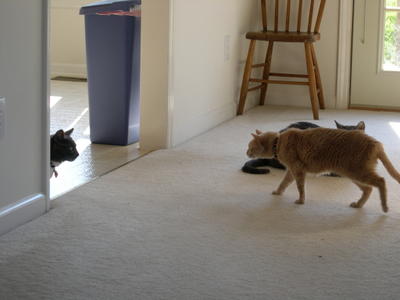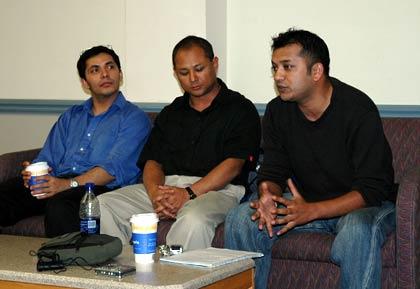Nepal's army has had a long, illustrious history. A lot of Nepali armed men have made a name for themselves all over the world over decades. But now that army stands at a historic juncture.
Armies are to fight external enemies. In rare cases they also get mobilized to confront internal armed groups. But peaceful demonstrators for democracy are out of bounds.
This is my appeal to all thinking officers in the Nepal army top to bottom.
The democracy movement is about to be launched in full force. The democratic government, once it gets into power, will punish all acts of physical assault on the peaceful demonstrators. Noone who might give orders for such physical assaults will go scot free this time.
This movement is not against the state structure. This is not a movement against the police, the army, the bureaucracy. This is a movement for democracy. This is a movement to create a democratic Nepal where the police, the army and the bureaucracy all work for the people, answer to the people. This is about transferring the ownership of the state to the people. This is not a movement to dismantle the state.
An army within a democratic Nepal will get better treated than it has ever been before. A democratic Nepal will be more prosperous, more proud. It will be more vibrant. It will be a happier country. The army will feel more at home in a democratic Nepal.
The army within a democratic Nepal will be a professional army. The promotion and perks structure will get vastly more meritocratic. There will be many more options for career advancements for its many officers. There will be many more opportunities for domestic pride and international peacekeeping.
A professional army in a democratic Nepal will be of unprecedented pride to all its members.
That army could become one of the symbols of national unity.
There will be peace in a democratic Nepal. The insurgency will be over. The army will no longer lose its members to meaningless violence.
The army, any army, ultimately is a keeper of peace, not a wager of war.
The army of a democratic Nepal will be more respected by the UN. The armed men and women of the Nepal army will be ambassadors of Nepal working for peace in the far flung corners of the planet.
That bright promise of a future requires that the rank and file and officers at all levels of the army be willing to appreciate the historic juncture the country is in. This movement for democracy is to be a once in a lifetime experience. This is to be decisive. This will not have to waged ever again.
The rank and file of the army, officers at all levels should be willing to defy orders as a last resort, if that is what it will take to make sure the villains of the current regime do not think they have the option to militarily crush the democracy movement.
All the army has to do is to stay out of the way. That is all.
And in return it will get treated like a professional army by the subsequent democratic government. It will get a respect it has never had before.
This is my appeal.
I urge all Nepalis all over the world who are supporting the movement in all ways they can to use all possible personal contacts they have inside the army to pass on this message.

